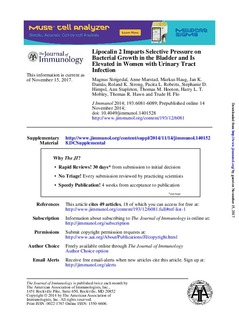Lipocalin 2 imparts selective pressure on bacterial growth in the bladder and is elevated in women with urinary tract infection
Steigedal, Magnus; Marstad, Anne; Haug, Markus; Damås, Jan Kristian; Strong, Roland K.; Roberts, Pacita L.; Himpsl, Stephanie D.; Stapleton, Ann; Hooton, Thomas M.; Mobley, Harry L.T.; Hawn, Thomas R.; Flo, Trude Helen
Journal article, Peer reviewed
Published version
Permanent lenke
http://hdl.handle.net/11250/2466350Utgivelsesdato
2014Metadata
Vis full innførselSamlinger
Sammendrag
Competition for iron is a critical component of successful bacterial infections, but the underlying in vivo mechanisms are poorly understood. We have previously demonstrated that lipocalin 2 (LCN2) is an innate immunity protein that binds to bacterial siderophores and starves them for iron, thus representing a novel host defense mechanism to infection. In the present study we show that LCN2 is secreted by the urinary tract mucosa and protects against urinary tract infection (UTI). We found that LCN2 was expressed in the bladder, ureters, and kidneys of mice subject to UTI. LCN2 was protective with higher bacterial numbers retrieved from bladders of Lcn2-deficient mice than from wild-type mice infected with the LCN2-sensitive Escherichia coli strain H9049. Uropathogenic E. coli mutants in siderophore receptors for salmochelin, aerobactin, or yersiniabactin displayed reduced fitness in wild-type mice, but not in mice deficient of LCN2, demonstrating that LCN2 imparts a selective pressure on bacterial growth in the bladder. In a human cohort of women with recurrent E. coli UTIs, urine LCN2 levels were associated with UTI episodes and with levels of bacteriuria. The number of siderophore systems was associated with increasing bacteriuria during cystitis. Our data demonstrate that LCN2 is secreted by the urinary tract mucosa in response to uropathogenic E. coli challenge and acts in innate immune defenses as a colonization barrier that pathogens must overcome to establish infection.
